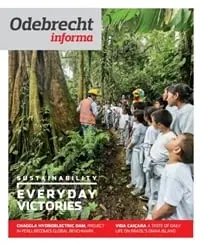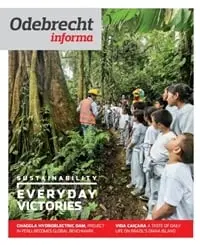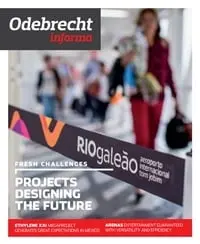Written by: Gabriela Vasconcellos
Photos by: Beg Figueiredo
Farmer Balbino Santos, 55, and his family have put down roots on the same land where his father and grandfather lived. He has always wanted to stay in the countryside, and that desire has grown along with his community’s development. Planted on his 8-hectare farm, Balbino’s crops – bitter and sweet cassava, pineapples and plantains – now have a guaranteed outlet: the Presidente Tancredo Neves Rural Producers Cooperative (Coopatan), located in the Southern Bahia Lowlands. This hasn’t always been the case. “Life’s been hard. The buyers used to set the price – when we had any buyers,” says the farmer, a resident of Riachão da Serra county in Valença, Bahia.

family farm: direct link with conscious
consumers
Balbino and his wife and children belong to the Cassava Cooperative Alliance. According to this model, farmers are organized in cooperatives that use the services of a processing plant – which gives products more value added – and merchants, who make room for them on their shelves in the spirit of partnership and solidarity. This creates a direct link with conscious consumers, ensuring that family farmers always get a fair price for their produce. The contributions of all the actors involved help strengthen this win-win game. In this case, Rural Family Houses also provide education, which is an integral and essential part of grooming the next generation of cooperative members.
The Cooperative Alliance’s innovative model is helping change lives in the Southern Bahia Lowlands – a micro-region in Northeastern Brazil formed by 11 counties that are home to more than 285,000 people. The Odebrecht Foundation has introduced the concept there and supports the Program for the Integrated and Sustainable Development of the Mosaic of Environmental Protection Areas in the Southern Bahia Lowlands (PDIS). This social technology was created to foster productive inclusion, eradicate poverty and reduce inequalities.
“Between 1998 and 1999, cassava farmers were experiencing a crisis in Presidente Tancredo Neves and the surrounding area. At that time, a kilo of cassava sold for three to five cents. It wasn’t profitable and didn’t bring in a fair income,” recalls Juscelino Macedo, the current leader of the Cassava Cooperative Alliance and one of the people who helped create Coopatan 11 years ago.
As a result, the community got organized and decided to cut out the middleman, selling their produce directly to major retail chains. The price of cassava quadrupled. Balbino remembers it well. “Now we have the right outlets for our production. We don’t lose our crops and there’s no downside,” he says. Thanks to the cooperative, producers now have access to farming methods that ensure higher quality and productivity: the average harvest has risen from 9 tonnes to 21 tonnes of cassava per hectare, a figure that reaches up to 68 t/ha on some farms.
Part of the Cassava Cooperative Alliance – which includes a cassava flour mill, Presidente Tancredo Neves Rural Family House (CFR-PTN), social partners and conscious consumers – Coopatan is changing the lives of 187 families. Recently, its members also started selling fruits and vegetables, which has given a further boost to the producers’ incomes.
“We are helping ensure that people stay in the countryside and enjoy quality of life. Even small farmers can earn an income compatible with their needs and become the protagonists of their own development,” says Fábio Sento Sé, Social Responsibility Manager at GBarbosa (Brazil’s fourth-largest supermarket chain) and Director of the GBarbosa Institute. In addition to marketing the cooperative’s products, this social partner has chosen to use Coopatan’s cassava flour as its own brand. Coopatan’s partners also include Walmart, Pão de Açúcar and Empresa Baiana de Alimentos (EBAL).
Synergy
Acting in line with Coopatan, the CFR-PTN seeks to provide high-quality professional education to young people, encouraging them to stay in the countryside and work on their family farms. The method used is the Pedagogy of Alternation, which allows students to spend a week at the school as boarders, with lessons in the classroom and in the field, and two weeks on their properties to apply what they have learned. Beneficiaries of the institution who have completed three years of schooling receive a high school diploma and a technical certificate in Agriculture.
Cooperative members go to the Family House once a week, taking part in classes and encouraging students to join their ranks. Currently, four Coopatan technicians are CFR-PTN alumni and 13 youths have joined the cooperative.
Balbino’s children are also actively taking part in the CFR-PTN. Abinael dos Santos, 17, graduated in 2010 and now works in the school’s financial department. “This is another learning experience for me. I want to buy a bigger property and make it sustainable,” says the young man, who divides his time between that experience and farm work.
Balbino’s youngest child, Ubiratam dos Santos, 15, used to think about taking off for the big city. However, his big brother’s example not only made him give up that idea but made him fall in love with farming. He has followed in Abinael’s footsteps and now studies at the CFR-PTN. “Ten years from now I’ll have my own farm, producing high-yield crops as a member of Coopatan,” says Ubiratam.
Abinael and Ubiratam are transferring all the knowledge they have acquired in practical and theoretical classes at the CFR-PTN to their family farm. Balbino stresses that these new methods are making their farm more productive. “When they go home, they talk about what they studied that week, and we go out into the fields to see what we’re doing wrong. Today we can see that it’s made a difference,” says their father. Antonia dos Santos, Balbino’s wife and the young men’s mother, wants to see her children fulfill their dreams and ambitions. “For me, peace of mind is having my family here with me on the farm.”
The path to sustainability
Balbino’s family is on its way to a future that is already the present for farmer Genival de Melo, 39. This rural producer is also a Coopatan member, and he is celebrating a major achievement. “Used to be, I had no place to live. I got married and went to live with my mother-in-law. Today we’ve managed to build our own home. We bought a new car, got a truck and are buying another piece of land,” says the resident of the Ouro Preto community, in Presidente Tancredo Neves. Like Balbino, Genival has been a cooperative member since Coopatan’s inception. “Anybody who left here around that time and came back today wouldn’t recognize the place. You couldn’t make a living in the countryside back then. I thought about leaving lots of times, but I believed in farming,” he says.
Five more cooperative alliances are also helping transform the Southern Bahia Lowlands: Piassava Straw, Hearts-of-Palm, Fish Farming, Construction and Starch. Together, they are contributing to the sustainable development of over a thousand families. “I’m proud to say that, nowadays, folks who live in the countryside have a good life,” emphasizes Genival.








